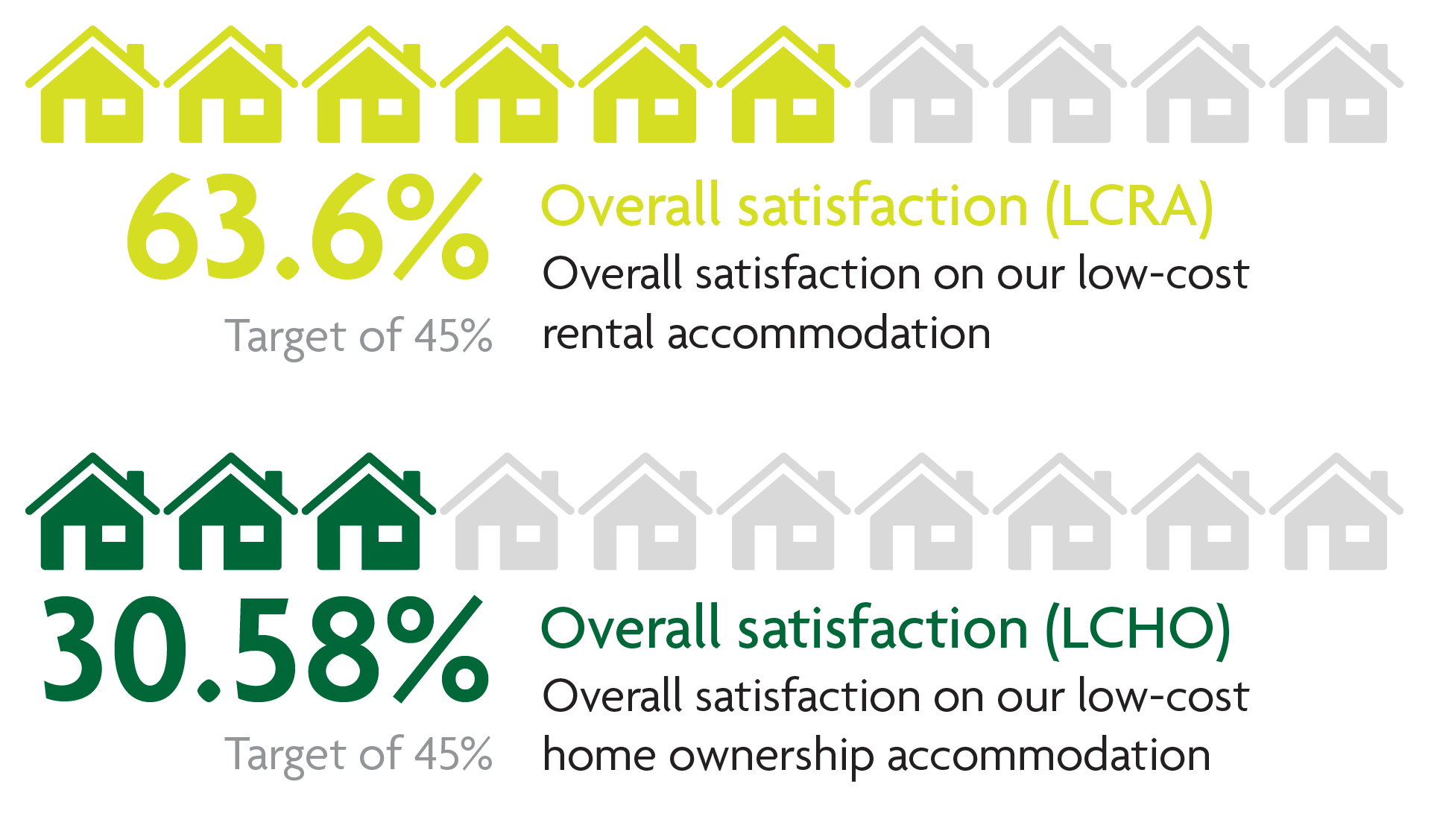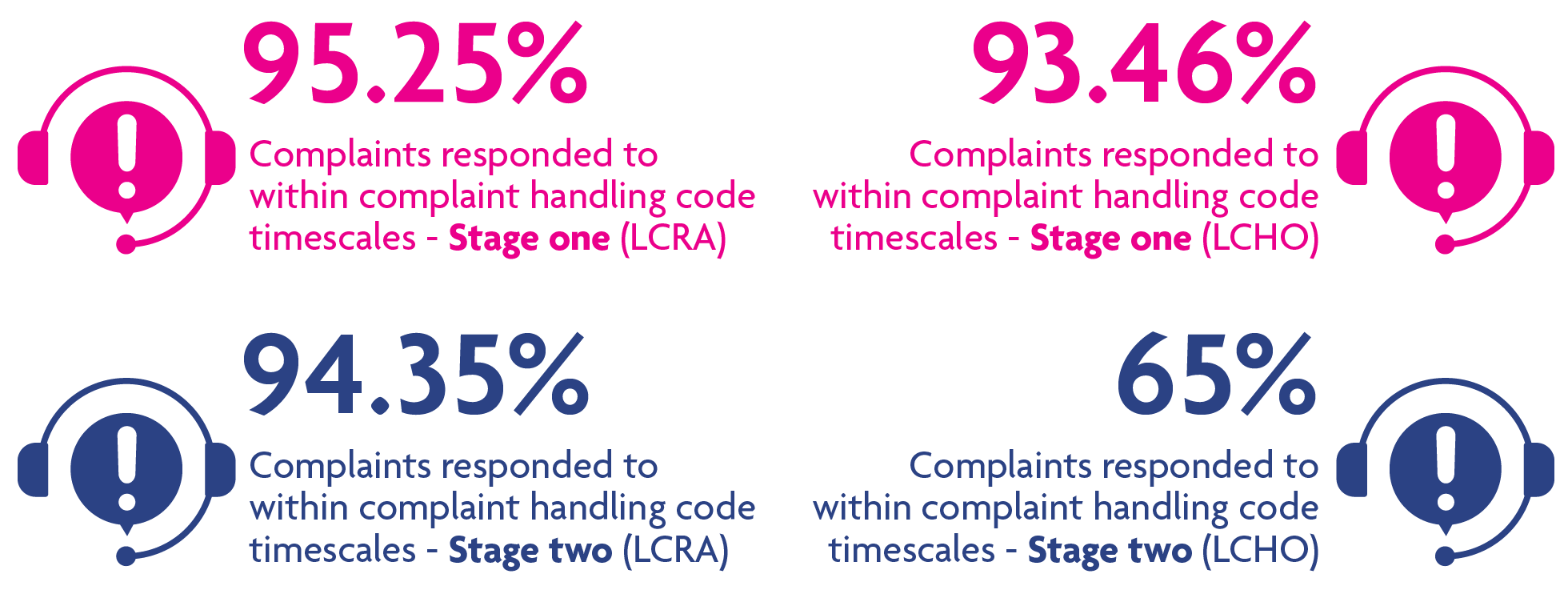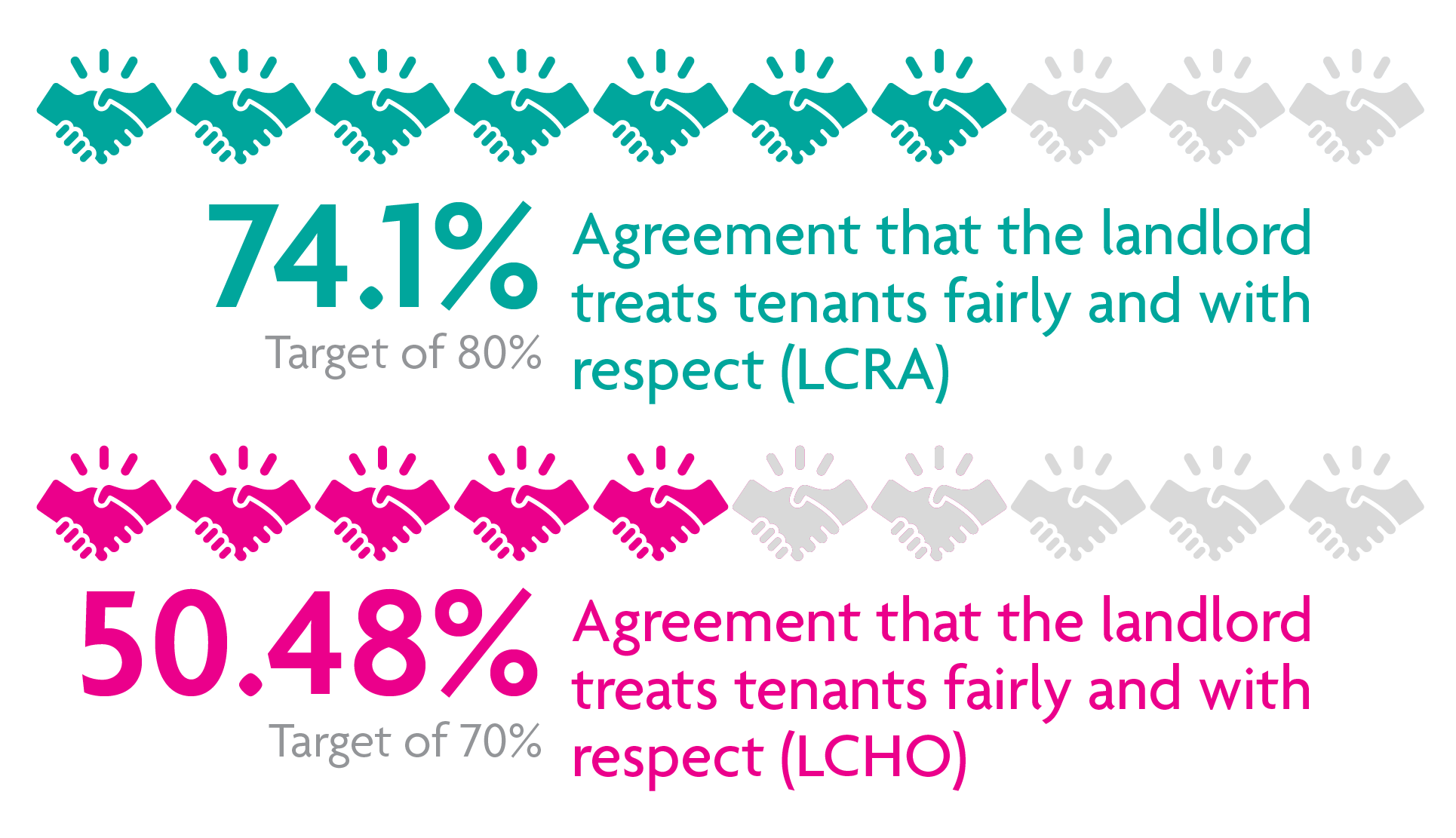How are we doing?
In April 2023, the Regulator of Social Housing introduced Tenant Satisfaction Measures (TSMs), these form part of a new system to show customers how landlords are performing. There are 22 measures, and the data is collected through management information and a rolling monthly telephone customer survey undertaken on our behalf by an independent company. They cover a wide range of topics from repairs, building safety and quality, respect, and engagement with customers, how we handle complaints and how to manage our neighbourhoods. You can read the full list of TSMs here.
This gives us and our customers a comprehensive overview of how we are doing. In 2024/25 we had 1147 responses to our surveys, 1026 from our low-cost rental accommodation and 121 from our low-cost home ownership. We reviewed the survey results and customer comments each month to understand what is important to you and help shape our services.
We’re pleased to report that overall satisfaction for residents in our rented (LCRA) tenure increased by 2% points in 2024/25. This reflects the positive impact of the improvement work we’ve carried out. However, we recognise there is more to do—particularly around satisfaction from shared owners (LCHO)—and we’re committed to making progress in this area.
Our approach
From the requirements from the Regulator of Social Housing our low cost rental accommodation survey responses needed to meet a set of defined criteria. For the satisfaction-related questions, we outsource a rolling monthly survey to Kwest Research. We use a statistically valid sampling approach to achieve a minimum overall accuracy of +/- 4% at a 95% confidence interval. The margin of error means the degree of uncertainty that the survey results may have and a confident interval means how much the survey results change compared to if all residents were surveyed. The lower the margin of error and the closer to 100% for the confidence interval will give a more accurate picture of the perception of all residents.
At the end of the data collection period in 2024/25 1,024 LCRA interviews had been completed. This provides a level of data accuracy of ±2.8% for the tenant results overall.”
As part of the sampling we used representative methods for age group, local authority area and stock type, due to monitoring from Kwest of these characteristics no weighting has been applied to the results.
Overall satisfaction

To improve our services in 2024/25, we focused on several key areas:
-
Customer service through the ‘Origin Oath’ – applying our core service principles to deliver a better customer experience.
-
Staff training and upskilling – empowering our contact centre team to respond to a wider range of queries more effectively.
-
Proactive communication – providing regular updates on communal issues affecting blocks and estates.
-
Repairs performance – particularly in relation to communal and specialist repairs.
-
Cross-team collaboration – working together more effectively to resolve complex estate and block issues.
-
Improved management of damp and mould – addressing concerns with a more proactive and consistent approach.
-
Managing Agents – strengthening our relationship management and review of service charges.We benchmark our performance through Housemark. At year-end, we were positioned in the median quartile compared to other providers in London. We remain committed to listening to resident feedback and continually improving the services we deliver.
Maintaining building safety
- Upgrading communal entrance doors to more robust models designed to better withstand vandalism
- Launching a pilot security warden scheme, delivered in partnership with two local authorities, to provide an additional visible safety presence in select areas.

Keeping properties in good repair

At the end of the year, 52 homes did not meet the decent homes standard - a reduction of 133 (2.39%) from the previous year. The reduction is due to our cross-department working group and their proactive improvement plan. The 52 remaining non-decent homes are due to individual hazards which are programmed for resolution.
Satisfaction with repairs improved by 3% points compared to last year reflecting the continued focus we’ve placed on listening to residents and acting on feedback for this vital service.

For our Gilmartins contract (which covers about two-thirds of our day to day repairs) our response targets are emergencies 2 hours or 24 hours (urgent) and 10 days for non-emergences. Their performance was 100% of emergencies and 91.37% non emergencies completed in target.

For other contractors, response times for emergencies are 4 hours (gas) and 24 hours and non-emergencies range from 7 to 28 days. Performance for these contractors was 74.34% of emergencies and 91.15% of non-emergencies completed in the target.
At the end of March 2025 the ownership of 685 homes was transferred from PfP to Orgin - the inclusion of these properties in our reporting for the year has impacted on the results, and without these our overall performance would have been over 91% of repairs within target.
To continue improving the repairs experience and overall resident satisfaction, over the coming year we will:
- Invest around £20 million in planned upgrades to homes and communal areas.
- Strengthen our management of leaks and damp and mould, acting effectively to remediate - Improve management of work in progress, with a focus on reducing delays and ensuring jobs are completed more efficiently.
We remain committed to delivering a responsive, reliable repairs service and will continue listening and acting on resident feedback to deliver improvements that matter most.

For other contractors, response times for emergencies are 4 hours (gas) and 24 hours and non-emergencies range from 7 to 28 days. Performance for these contractors was 65.3% of emergencies and 78.5% of non-emergencies completed in the target.
Our improvement efforts are focused on:
- Working with Gilmartins as well as specialist contractors to reduce overdue work-in-progress and improve communication with residents, especially for repairs taking longer than they should and communal area issues such as building security.
- Enhancing our management of damp and mould by raising awareness on how to report cases and acting effectively to fix the issue.
- Continuing our stock condition survey and analysis to develop a forward investment programme so that it can be shared with residents.
Effective handling of complaints

We encourage residents to get in touch when things go wrong so that we can fix the issue and learn from mistakes. The main reasons for customer complaints last year were repair delays, property condition, lack of communication, missed contractor appointments and staff attitude.

The main drivers for complaints were delays to repair, condition of home and lack of communication. More residents felt they needed to use the complaint process in order to get their issue resolved. Our focus is on service delivery in the operational teams and ensuring we deliver on the commitments we make to resolve customer issues. We are working closely with our repair contractors to act on customer feedback and improve the service.

Respectful and helpful engagement

Our improvement efforts are focused on:
- Ensuring timely and comprehensive responses to queries
- consideration of any additional needs that a customer or household member has when we are delivering services
- Working with Gilmartins and specialist contractors to complete repairs and improve communication on complex repairs.
- Continuing with neighbourhood walkabouts so that local issues can be discussed and addressed.
Responsible neighbourhood management

Residents expressing dissatisfaction have told us that this is due to the condition of their estate, window cleaning quality and frequency, unauthorized access to communal areas and security issues associated with area-based antisocial behaviour (ASB).
- We also focused on improving the skills of our Neighbourhood Managers, delivering additional training on effective ASB case management and the available remedies. This ensures our team is better equipped to handle and resolve issues.
- Monitoring estate standards is a key responsibility of both our Estate Services Team Leaders and Neighbourhood/Homeownership Managers, and we value the active involvement of residents in this process. Customer feedback helps us maintain high standards and identify areas for improvement.
- Procured a new window cleaning contractor with improvements in the quality of service to be delivered over this year.
- Used insights from a resident scrutiny review to guide the procurement of a new grounds maintenance contract.
* low-cost rental accommodation (LCRA)
* low-cost home ownership accommodation (LCHO)